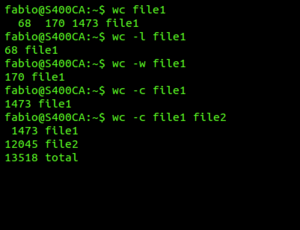wc (Unix)
wc (short for word count) is a command in Unix and Unix-like operating systems.
 The wc command | |
| Original author(s) | Joe Ossanna |
|---|---|
| Developer(s) | AT&T Bell Laboratories |
| Initial release | November 3, 1971 |
| Operating system | Unix, Unix-like, V, Plan 9, Inferno, MSX-DOS |
| Type | Command |
The program reads either standard input or a list of files and generates one or more of the following statistics: newline count, word count, and byte count. If a list of files is provided, both individual file and total statistics follow.
Example
Sample execution of wc:
$ wc foo bar
40 149 947 foo
2294 16638 97724 bar
2334 16787 98671 total
The first column is the count of newlines, meaning that the text file foo has 40 newlines while bar has 2294 newlines- resulting in a total of 2334 newlines. The second column indicates the number of words in each text file showing that there are 149 words in foo and 16638 words in bar – giving a total of 16787 words. The last column indicates the number of characters in each text file, meaning that the file foo has 947 characters while bar has 97724 characters – 98671 characters all in all.
Newer versions of wc can differentiate between byte and character count. This difference arises with Unicode which includes multi-byte characters. The desired behaviour is selected with the -c or -m options.
History
wc is part of the X/Open Portability Guide since issue 2 of 1987. It was inherited into the first version of POSIX.1 and the Single Unix Specification.[1] It appeared in Version 1 Unix.[2]
GNU wc used to be part of the GNU textutils package; it is now part of GNU coreutils. The version of wc bundled in GNU coreutils was written by Paul Rubin and David MacKenzie.[3]
The command is available as a separate package for Microsoft Windows as part of the GnuWin32 project[4] and the UnxUtils collection of native Win32 ports of common GNU Unix-like utilities.[5]
A wc command is also part of ASCII's MSX-DOS2 Tools for MSX-DOS version 2.[6]
Usage
wc -c <filename>prints the byte countwc -l <filename>prints the line count (note that if the last line does not have \n, it will not be counted)wc -m <filename>prints the character countwc -w <filename>prints the word countwc -L <filename>prints the length of the longest line (GNU extension)
See also
References
- – Commands & Utilities Reference, The Single UNIX Specification, Issue 7 from The Open Group
- – FreeBSD General Commands Manual
- https://linux.die.net/man/1/wc
- CoreUtils for Windows
- Native Win32 ports of some GNU utilities
- MSX-DOS2 Tools User's Manual by ASCII Corporation
External links
| The Wikibook Guide to Unix has a page on the topic of: Commands |
- wc(1) - Original Unix First Edition manual page for wc.
- – Linux User Commands Manual
- – Plan 9 Programmer's Manual, Volume 1
- The wc Command by The Linux Information Project (LINFO)